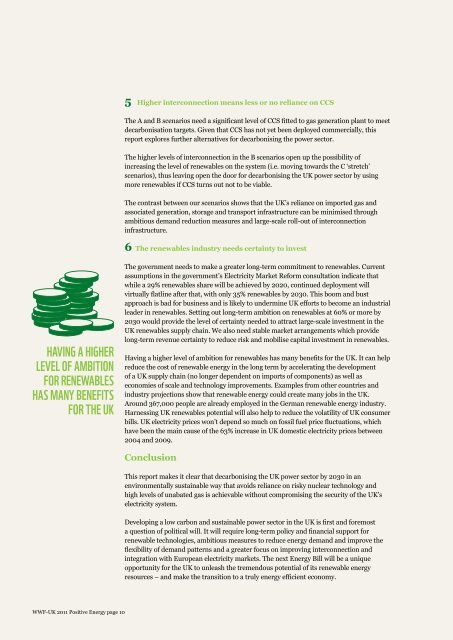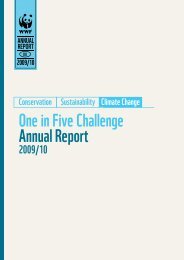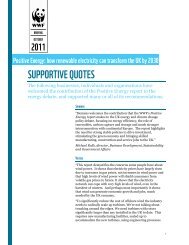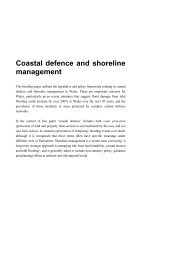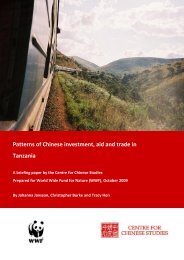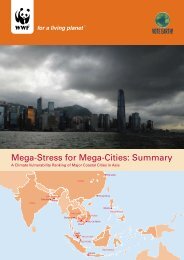Positive Energy: how renewable electricity can transform ... - WWF UK
Positive Energy: how renewable electricity can transform ... - WWF UK
Positive Energy: how renewable electricity can transform ... - WWF UK
You also want an ePaper? Increase the reach of your titles
YUMPU automatically turns print PDFs into web optimized ePapers that Google loves.
5 Higher interconnection means less or no reliance on CCS<br />
The A and B scenarios need a signifi<strong>can</strong>t level of CCS fitted to gas generation plant to meet<br />
decarbonisation targets. Given that CCS has not yet been deployed commercially, this<br />
report explores further alternatives for decarbonising the power sector.<br />
The higher levels of interconnection in the B scenarios open up the possibility of<br />
increasing the level of <strong>renewable</strong>s on the system (i.e. moving towards the C ‘stretch’<br />
scenarios), thus leaving open the door for decarbonising the <strong>UK</strong> power sector by using<br />
more <strong>renewable</strong>s if CCS turns out not to be viable.<br />
The contrast between our scenarios s<strong>how</strong>s that the <strong>UK</strong>’s reliance on imported gas and<br />
associated generation, storage and transport infrastructure <strong>can</strong> be minimised through<br />
ambitious demand reduction measures and large-scale roll-out of interconnection<br />
infrastructure.<br />
6 The <strong>renewable</strong>s industry needs certainty to invest<br />
HAVING A HIGHER<br />
LEVEL OF AMBITION<br />
FOR RENEWABLES<br />
HAS MANY BENEFITS<br />
FOR THE <strong>UK</strong><br />
The government needs to make a greater long-term commitment to <strong>renewable</strong>s. Current<br />
assumptions in the government’s Electricity Market Reform consultation indicate that<br />
while a 29% <strong>renewable</strong>s share will be achieved by 2020, continued deployment will<br />
virtually flatline after that, with only 35% <strong>renewable</strong>s by 2030. This boom and bust<br />
approach is bad for business and is likely to undermine <strong>UK</strong> efforts to become an industrial<br />
leader in <strong>renewable</strong>s. Setting out long-term ambition on <strong>renewable</strong>s at 60% or more by<br />
2030 would provide the level of certainty needed to attract large-scale investment in the<br />
<strong>UK</strong> <strong>renewable</strong>s supply chain. We also need stable market arrangements which provide<br />
long-term revenue certainty to reduce risk and mobilise capital investment in <strong>renewable</strong>s.<br />
Having a higher level of ambition for <strong>renewable</strong>s has many benefits for the <strong>UK</strong>. It <strong>can</strong> help<br />
reduce the cost of <strong>renewable</strong> energy in the long term by accelerating the development<br />
of a <strong>UK</strong> supply chain (no longer dependent on imports of components) as well as<br />
economies of scale and technology improvements. Examples from other countries and<br />
industry projections s<strong>how</strong> that <strong>renewable</strong> energy could create many jobs in the <strong>UK</strong>.<br />
Around 367,000 people are already employed in the German <strong>renewable</strong> energy industry.<br />
Harnessing <strong>UK</strong> <strong>renewable</strong>s potential will also help to reduce the volatility of <strong>UK</strong> consumer<br />
bills. <strong>UK</strong> <strong>electricity</strong> prices won’t depend so much on fossil fuel price fluctuations, which<br />
have been the main cause of the 63% increase in <strong>UK</strong> domestic <strong>electricity</strong> prices between<br />
2004 and 2009.<br />
Conclusion<br />
This report makes it clear that decarbonising the <strong>UK</strong> power sector by 2030 in an<br />
environmentally sustainable way that avoids reliance on risky nuclear technology and<br />
high levels of unabated gas is achievable without compromising the security of the <strong>UK</strong>’s<br />
<strong>electricity</strong> system.<br />
Developing a low carbon and sustainable power sector in the <strong>UK</strong> is first and foremost<br />
a question of political will. It will require long-term policy and financial support for<br />
<strong>renewable</strong> technologies, ambitious measures to reduce energy demand and improve the<br />
flexibility of demand patterns and a greater focus on improving interconnection and<br />
integration with European <strong>electricity</strong> markets. The next <strong>Energy</strong> Bill will be a unique<br />
opportunity for the <strong>UK</strong> to unleash the tremendous potential of its <strong>renewable</strong> energy<br />
resources – and make the transition to a truly energy efficient economy.<br />
<strong>WWF</strong>-<strong>UK</strong> 2011 <strong>Positive</strong> <strong>Energy</strong> page 10


